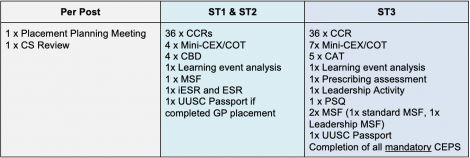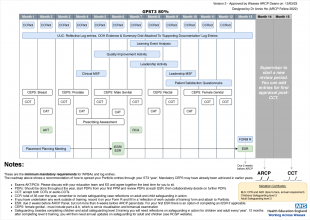How to acheive an Outcome 1 at your ARCP
If awarded an ‘Outcome 1’ at ARCP it means you’re making satisfactory progress and “achieving progress and the development of competencies at the expected rate”.
- ESR
- Form R
- BLS and PBLS
- Safeguarding – Adult and Child mandatory training in addition to clinical case reviews (1x adult CCR and 1x paediatric CCR)
- Quality Improvement: x1 QIP ideally in a GP placement during ST1 or ST2 and x1 QIA each year (though a QIA is not required if you complete a QIP in that specific training year). For example: a QIA during ST1 and ST3 and a QIP in ST2 during GP placement. See more on QIP/QIA below.
- WBPA and other mandatory requirements:

Also see the RCGP mandatory evidence table here:
Below are common reasons that the GP school identified for Doctors in Training (DiT) receiving unsatisfactory outcomes at their ARCP:
- Missing ESR
- Sometimes the ESR has not been signed off at all.
- Other times the DiT & ES think they have signed it off, but they haven’t
- Form R hasn’t been completed. Make sure Form R is:
- Is completed on TIS
- On part A, has selected “I confirm I have been appointed to a programme leading to award of CCT.”
- Part A AND B uploaded to the ePortfolio compliance passport
- Is completed correctly e.g. TOOT declaration matches the TOOT previously recorded on the ePortfolio (this includes time for sickness and industrial action).
- BLS – CPR/AED. Things to watch out for here:
- Certificate valid and within 12 months
- Certification clearly states that the course:
- Was face to face
- Covered both adult & child life support (child life support is not mandatory but still preferable if you have not done a job where you are working with children since your last ARCP).
- Covered the use of automated external defibrillators (AEDs).
- The Doctor in Training’s (DiT) name & course completed date is visible on the provided evidence.
- If your certificate does not specify that you completed paediatric life support, but it was done, then add a learning log supplementary evidence entry detailing that it covered paeds and what learning was covered.
- Safeguarding – level 3 adult and child:
- Certificates must be visible and no more than 3 years old.
- Must be completed in ST1 if no existing certificate prior to commencing training.
- If completed in ST1, in theory would remain valid throughout training if working 100%. E.g. level 3 certification on safeguarding conducted via e-learning.
- If L3 certificates were issued over 12 months ago there should be evidence of an Annual Knowledge Update e.g. a knowledge update course ran locally, i.e. ST2/3 need to complete a yearly knowledge update.
- One reflective log entry for each adults and children safeguarding for each year of training, demonstrating application of your safeguarding knowledge and can either be cases that you have managed personally, or one that you have discussed in a safeguarding practice or training meeting. The reflections should be clearly titled “Adult Safeguarding” and “Child Safeguarding” to ensure they are easily identified and linked to the relevant safeguarding training in your compliance passport (by clicking “Link to mandatory training”).
- Quality Improvement
- A QIA or QIP entry can be rejected at panel if it does not meet the RCGP criteria as below. The QIP must be completed on the correct assessment form with all the sections complete and all of them assessed and rated by your supervisor.
- QIA:
- Should involve a personal connection to your work and look to create an improvement and/or change, which requires action to be taken
- Examples:
- Review of personal outcome data e.g. referral review
- Local/national audit with data collection at a local level
- Small specific QIP using PDSA cycle
- Writing/revising local policy
- QIP:
- Must be conducted in a primary care setting
- Should have clearly outlined aims
- Demonstrate engagement with the team and other stakeholders
- Evidence implementation of change and clear data gathering, ideally with two PDSA cycles.
- WBPA – Workplace Based Assessments
- The minimum number of WPBA and CCRs must be met for each training year, and cannot be carried forward if an excess number were completed in a previous training year.
- “The required number of WPBA or CCRs has not been met”. Common reasons are:
- DiT not completing the required minimum number
- A Clinical Case Review is discounted as it does not relate to a clinical encounter with a patient, and therefore should have been recorded as a different entry.
- A learning log or assessment does not meet the RCGP criteria in which case panel can ask DiT to re-write them or add further information
- MSF/PSQ has been started but not completed
Many thanks to Dr Stuart Roney for consenting to the publication of this information on this website.
Training Roadmaps
Wessex Deanery have kindly shared their roadmaps which are a guide to meeting ARCP requirements according to stage of training and working time (i.e. full time or less than full time). They are really helpful for planning your approach to meeting ARCP requirements so that things are spread evenly across a review period or training year.
They are available for download through your Fourteen Fish account, or from the GP Educators pages here.

These can be accessed directly through your Fourteen Fish account on the Portfolio page > Training Map > Roadmaps.
Please see the visual guide below to assist with accessing this resource.
The Severn Deanery School of Primary Care site has lots of useful information about ARCP requirements in their trainee pages.